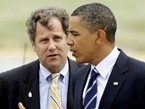Newly uncovered press items from the Communist Party USA (CPUSA) are raising concerns about how the CPUSA might be influencing Sherrod Brown’s policy stances. The CPUSA appears to believe it has a vested interest in the senator.
Prior to his public announcement of candidacy for the Ohio Senate seat, Brown exhibited affinity with the CPUSA by permitting an editorial he authored to be published in the communist paper, the People’s World. In the piece, Brown argued that mild entitlement reforms passed in 2003 justified lamenting that “democracy crumbles under the cover of darkness.” Apparently, CPUSA agreed with the senator.
In the midst of Brown’s first Senate race, Rick Nagin, a Communist Party leader in Ohio, admitted that the Communist Party used the state minimum wage referendum to enhance the Brown vote. As the chair of the CPUSA Political Action Commission stated, “Defeat of the ultra-right Republicans is at the heart of the class struggle at this moment… a necessary and crucial step toward achieving a better life, bigger dreams and building the movement for socialism.”
The People’s Weekly erupted with joy after Sherrod Brown’s election to the Senate, exclaiming, “this newspaper said Congress was not only winnable for the anti-ultra- right coalition, but a necessary step for any democratic progress in this country. We hail this victory and will continue to fight this good fight.”‘
The CPUSA immediately began efforts to transform their electoral victory into policy implementation. The CPUSA clearly stated:
In Ohio, a conference next month will bring together all organizations who worked for the election of Sherrod Brown to US Senate to develop a unity program for healthcare and other issues. Similar ideas are being pursued in other states to keep up grass roots pressure on the issues, and relate with the new members of Congress. Certainly one of the first fights will be for enactment of the Employee Free Choice Act (EFCA) to restore workers’ rights to organize into unions. This legislation is strategic to changing the balance of forces in our country.
The efforts by the Communist Party to elect Brown in 2006 did not go unrewarded, either on health care or EFCA. The People’s World, paper of the Communist Party, glowingly reported on Sherrod Brown’s speech to a health care reform rally in 2009. “I would love to see a single payer system,” Brown said, “but that is not possible right now.” As a compromise with the long-term plan of a nationalized health care system, Brown went on to express support of a public option. Throughout the raging healthcare debate on the Hill, Brown joined the most radical voices. On health care, the public deserves to know whether Senator Brown still intends on pushing forward with further nationalization of health services. Just last week, Senator Brown boasted that the Obamacare vote was the “best” and “most important” he had ever cast.
In addition, the senator became an erstwhile supporter of the Orwellian named Employee Free Choice Act. The act claims to safeguard free choice for employees determining whether to unionize. In actuality, however, EFCA makes it easier to intimidate those employees who prefer to negotiate wages on their own. Rather than require a secret ballot to form a union, EFCA designated that a union could be formed by gathering “cards” with signatures from a majority of employees. Without the protection of a secret ballot, some employees inevitably feel pressured to sign the unionization card in order to prevent retaliation should unionization occur. EFCA benefits those seeking to aggregate power–the union bosses–at the expense of the individual.
The public deserves to know what steps Senator Brown is taking to protect himself against undue influence from the CPUSA.

COMMENTS
Please let us know if you're having issues with commenting.